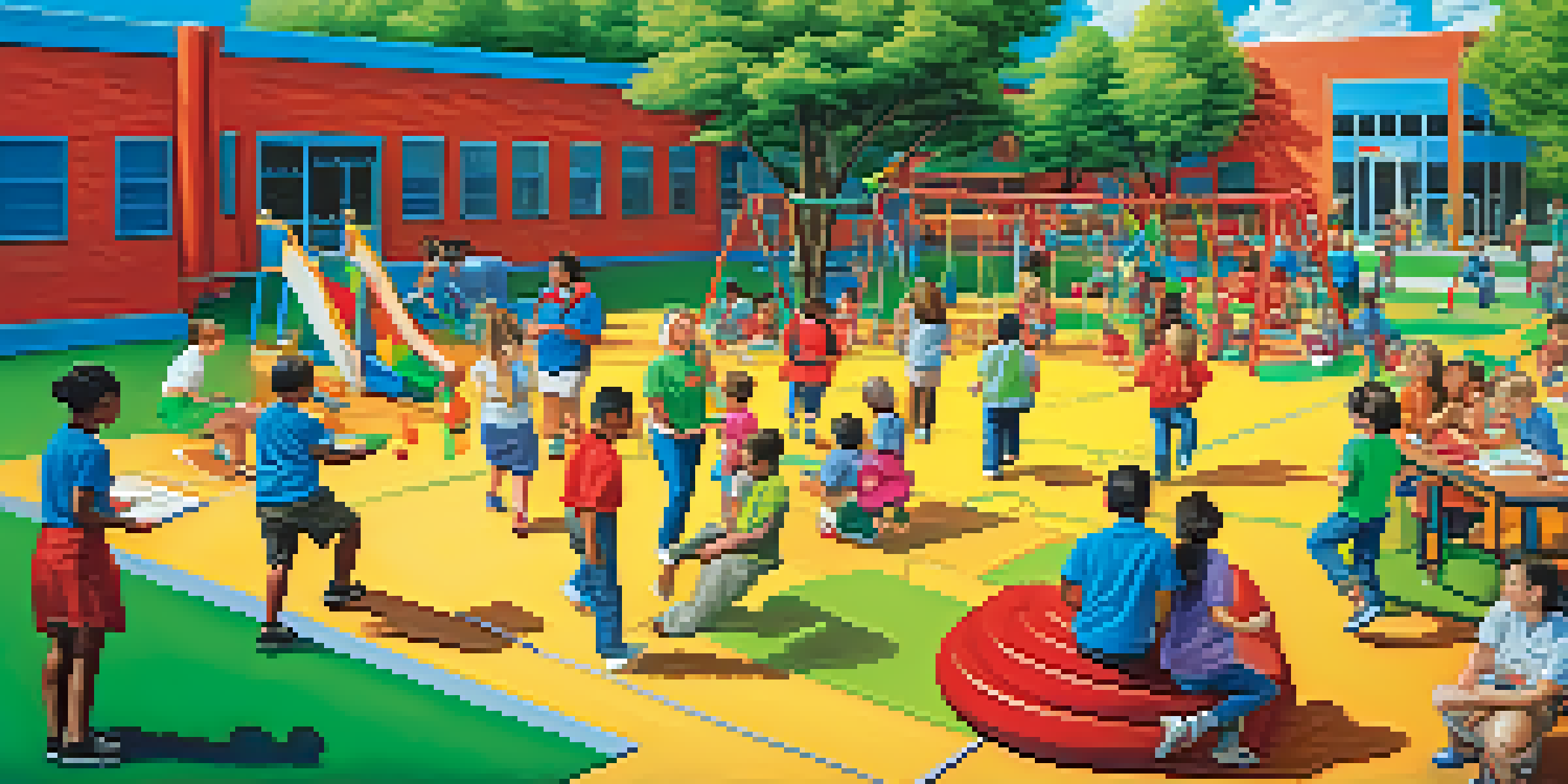Understanding the Importance of Play for Teacher Well-Being

The Role of Play in Teacher Mental Health
Play is often viewed as essential for children's development, but it's equally important for teachers. Engaging in playful activities helps educators relieve stress and recharge their mental batteries. This rejuvenation is crucial, as teaching can be a demanding profession, often leading to burnout without proper self-care.
Play is the highest form of research.
When teachers participate in play, whether through games, creative expression, or team-building activities, they foster a sense of community and connection with their colleagues. This camaraderie not only enhances the work environment but also provides a support system during challenging times. The lightheartedness of play can transform the atmosphere in a school, making it more enjoyable for both teachers and students.
Moreover, play encourages teachers to tap into their creativity, which can reignite their passion for teaching. By stepping away from the traditional structure of lesson planning and classroom management, they can explore new ideas and methods. This playful exploration can lead to innovative teaching strategies that benefit students and invigorate the entire classroom experience.
Building Resilience Through Play
Resilience is a vital trait for teachers, helping them navigate the ups and downs of the academic year. Engaging in play can build this resilience by allowing educators to experience joy and laughter, even in tough situations. When teachers can laugh at themselves and embrace a playful attitude, they can better handle stress and setbacks.

For instance, participating in playful activities can serve as a valuable coping mechanism during high-pressure times, such as exam periods or curriculum changes. It provides a mental break, allowing teachers to return to their responsibilities with a refreshed perspective. This shift in mindset can lead to a more positive and productive work environment.
Play Boosts Teacher Mental Health
Engaging in playful activities helps educators relieve stress, recharge, and foster connections with colleagues.
Additionally, by modeling resilience through play, teachers can inspire their students to adopt similar attitudes. When educators demonstrate how to cope with challenges using humor and creativity, they empower students to develop their own resilience. This cycle of positivity can create a thriving classroom culture where both teachers and students feel supported.
Fostering Creativity with Playful Activities
Creativity is a cornerstone of effective teaching, and play is a powerful catalyst for fostering it. When teachers engage in playful activities, they open their minds to new possibilities and innovative ideas. This creative mindset is essential for designing engaging lessons that captivate students' attention.
The greatest gifts you can give your children are the roots of responsibility and the wings of independence.
For example, incorporating play into professional development can lead to more dynamic workshops and training sessions. Teachers can collaborate with their peers in a relaxed setting, brainstorming fresh approaches to classroom challenges. This playful collaboration not only enhances creativity but also strengthens professional relationships.
Moreover, playful experiences can help teachers discover their own unique teaching styles. By experimenting with different methods and activities, educators can find what resonates with them and their students. This authenticity in teaching enriches the learning experience, making it more memorable and impactful.
The Social Benefits of Play for Educators
Play serves as a social glue, bringing educators together in meaningful ways. Sharing playful experiences can help break down barriers and foster stronger connections among colleagues. These relationships are vital in building a supportive network that teachers can rely on throughout the school year.
Participating in playful activities, such as team-building games or informal gatherings, can create a sense of belonging within the school community. When educators feel connected to one another, they are more likely to collaborate and share resources, ultimately benefiting their students. This collegiality enhances the overall school culture.
Creativity Flourishes Through Play
Play encourages teachers to explore new ideas and teaching strategies, enhancing the overall classroom experience.
Additionally, a supportive network can lead to healthier mental well-being. Knowing that you have colleagues who understand your struggles and can share in your successes makes a significant difference. This camaraderie can be nurtured through regular play, creating an environment where everyone feels valued and supported.
Promoting Work-Life Balance with Play
Maintaining a healthy work-life balance is critical for teacher well-being, and play can help achieve this. When educators prioritize play, they create boundaries that separate their professional responsibilities from personal time. This balance is essential for preventing burnout and maintaining enthusiasm for teaching.
Incorporating play into daily routines, whether through short breaks or scheduled activities, allows teachers to step away from their workloads. This break can be as simple as a quick game of cards or a fun brainstorming session with colleagues. These moments of play provide a refreshing reset, enabling educators to return to their tasks with renewed energy.
Ultimately, prioritizing play not only benefits teachers but also positively impacts their students. When teachers model a balanced lifestyle that includes play, they promote healthy habits in their students as well. This holistic approach to well-being fosters a positive learning environment for everyone involved.
Play as a Tool for Professional Development
Professional development does not have to be a dry and monotonous process. Incorporating play into training sessions can make learning more engaging and effective for teachers. Playful strategies can stimulate collaboration and creativity, allowing educators to explore new concepts in an enjoyable way.
For example, role-playing scenarios can help teachers practice classroom management techniques or explore new teaching methodologies. These interactive experiences provide immediate feedback and allow for reflection in a supportive environment. This hands-on approach can lead to better retention of new skills and ideas.
Play Promotes Work-Life Balance
Incorporating play into daily routines helps teachers maintain a healthy work-life balance, preventing burnout.
Additionally, playful professional development can encourage teachers to take risks and try new things in their classrooms. By feeling comfortable in a playful setting, educators may be more willing to experiment with innovative teaching methods. This willingness to innovate ultimately benefits students and enhances the overall educational experience.
Integrating Play into the School Culture
For play to truly benefit teacher well-being, it must be integrated into the school culture. This means creating an environment where play is valued and encouraged, from administration to staff. When the school leadership prioritizes play, it sets a tone that resonates throughout the entire institution.
Simple initiatives, such as organizing regular play days or incorporating playful elements into staff meetings, can make a significant difference. These activities create a culture where educators feel comfortable expressing themselves and enjoying their work environment. This positive culture can help reduce stress and promote well-being among teachers.

Furthermore, encouraging play helps establish a more vibrant school community. When teachers and staff engage in fun activities together, they foster a sense of belonging that extends beyond the classroom. This unity ultimately contributes to a more positive atmosphere for both educators and students, enhancing the overall educational experience.